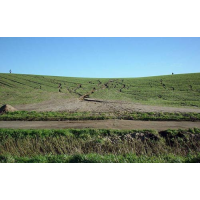Farming Research

Lancaster University is working with farmers to discover efficient new ways of protecting the environment from phosphorous and sediment.
The £449,000 research programme is funded by the Department for Environment and Rural Affairs (DEFRA) and will run for three-and-a-half years.
It aims to discover the most cost effective, efficient methods of preventing phosphorus and sediment running off agricultural land and into rivers and streams.
Phosphorus, which occurs naturally in soils, is also added to soils in mineral and organic fertilisers. After rainfall, phosphorous and sediment can be washed off the land and causing problems such as eutrophication and damage to spawning grounds.
Trials will be carried out at three working farms in Leicestershire, Herefordshire and Staffordshire to discover which preventative techniques are the most efficient.
Dr John Quinton from the University’s Environmental Science department is coordinating the project, which is run in conjunction with partners from the University’ s Centre for Sustainable Water Management, the Agricultural Development and Advisory Service (ADAS), and the Department of Agriculture, Reading University
Dr Quinton said the project would review and test a number of options, which limit the movement of phosphorus and sediment from agricultural fields into the wider environment. These include: different cultivation techniques; use of cover crops; tramline management and vegetative barriers. At each stage of the experiment the research team will collect rainwater running off the three sites and take it back to University laboratories for analysis. The team then will come up with a series of recommendations based on their findings.
He said “The project will test some simple, affordable measures that will be a realistic option for farmers who want to reduce the amount of phosphorous and sediment running off their land. These recommendations can be taken forward by DEFRA and potentially worked into their entry level and higher tier Environmental Stewardship schemes.”